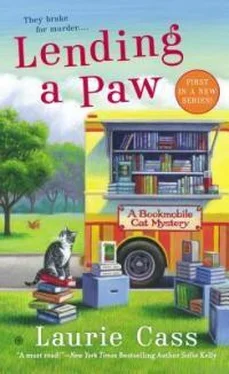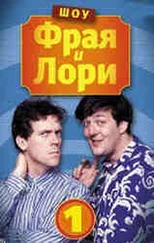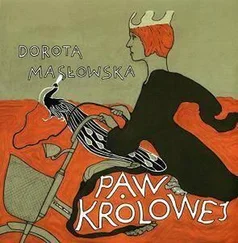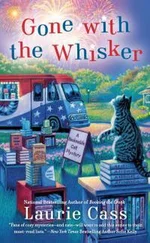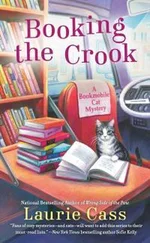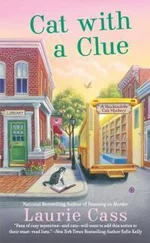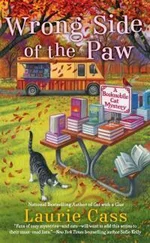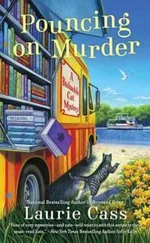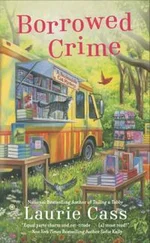If a pair she hadn’t intended was forming, all her plans would be toast. “Well, you haven’t missed yet, have you?”
“There’s always a first time,” she muttered.
“You said the same thing last year and that turned out fine by the end of the summer,” I said. “You can’t expect August endings in June. Especially early June. Don’t you always say that building a lasting love is like building Rome? That it can’t be done in a day?”
She hmm ed a little, thinking it over. “You’re right,” she said. “You’re so right that I think I’ll stop worrying.” She winked, grinning. “No point in it, anyway.”
It was impossible not to smile back; my aunt had a very contagious grin. “There’s lots of time,” I said.
“Time for what?”
I jumped. Aunt Frances turned to Paulette, the boarder who’d been matched with Quincy, and said, “I was wondering if there was time to have another cup of coffee before breakfast. Do you have any idea what those two are cooking up for us?”
The pleasantly plump, tawny-haired woman scowled. “Nobody tells me anything around here.” She stomped off, her pink flip-flops popping loudly with each stomp.
“Bugger,” Aunt Frances muttered.
“No, it’s good,” I said softly. “Paulette is already in love with Quincy. She’s nuts with jealousy.”
“But how does that help with Dena and Harris? And how does it get Quincy to quit pretending he’s twenty-five when he’s fifty?”
“You’ll figure it out. You always do.”
A bell rang, clear and bright. Years upon years ago, the bell from an old train engine had been hauled up into a maple tree outside the kitchen porch. One end of a rope was tied to the top of the bell; the other end was attached to the porch. The sound of the bell meant summer, blue skies, and food.
A dark-haired woman poked her head through the dining room doorway. “Ah. There you are. Good morning, Minnie. Come on in, breakfast is ready.”
“Hi, Zofia,” I said. Seventy, spry, and widowed for five years, Zofia had finally loosed herself from her children’s clutches long enough to scamper north for the summer. “I’ll be staying with an old friend,” she’d told them, lying through her teeth.
“Coffee’s fresh.” Zofia waved us into the dining room and gestured at the wide-planked pine sideboard. “Tea water is hot, orange juice is cold.”
Aunt Frances took her seat at the head of the table. “Zofie, you haven’t been helping, have you? You’ll get your turn next week.”
“What, me, be useful?” Zofia put her palms flat against her collarbone and opened her eyes wide.
With a name like Zofia and her tendency to flowing skirts and dangling earrings, anyone would have guessed her to have been an actress, a Gypsy fortune-teller in a carnival, or at the very least a high school drama teacher. In reality, Zofia had married her childhood sweetheart, stayed home to raise their four children, and supported her husband in his career as a vice president for a major car company.
I took Aunt Frances a cup of coffee and greeted the others as they came in through various doors. Harris, the just-graduated college kid, from the back porch. Leo, whom Aunt Frances had matched with Zofia, came in through the living room, the morning newspaper in his hand. Paulette followed Leo, still stomping.
“And heeeeeere we come!” Quincy pushed open the swinging door between the kitchen and dining room. His mostly bald head was red with heat. “Ready or not!” He held the door open for a willowy young woman who was the triple threat of thin, beautiful, and smart. It was a combination that made me long to hate her, but I hadn’t figured out how to. She was too nice.
Dena smiled up at Quincy. “Thanks,” she said, maneuvering around him. He beamed and I started to share some of Aunt Frances’s worry. Dena was carrying a plate in each hand and another up each arm. She’d learned the trick, she’d told me, while waitressing in college. “Hash browns, bacon baked with maple syrup, fried eggs, and melon slices.” She gave Aunt Frances the first plate. “Nothing burned and nothing raw except what should be.”
After a few moments of pleasurable eating, Aunt Frances turned to Leo. “Did you get the newspaper?”
His mouth full, he nodded.
The paper! I’d forgotten all about it. News of Stan’s death was bound to be on the front page. I had no idea if my name would be in print or not, but it very well could be. I mentally kicked myself for not calling Aunt Frances last night. And Kristen. I really should have told Kristen. And my . . . well, not my mom. I wasn’t ready to deal with her concern. I loved my parents dearly, but Mom’s mothering method involved a lot of what, in my teenage years, I’d called smothering. There was more than one reason I lived a five-hour drive away from my parents.
My aunt piled her fork full of hash browns. “Anything important in the paper this morning? These are outstanding, Dena, by the way.”
“Um, Aunt Frances? Could I talk to you a minute in the kitchen?” The breakfast table didn’t seem like the best place to discuss finding a dead body.
“Hang on, kiddo.” She was watching Leo, who’d picked up the newspaper and was waving it at her.
“A guy was killed out in the east part of the county.”
“Oh?” Aunt Frances’s eyes were going up and down, matching the flapping of the newspaper as she tried to read the headline. “What was his name?”
“Don’t remember,” Leo said. “But he was murdered.”
Surprised murmurs ran around the table.
“Bar fight?” Zofia asked.
“Bet there was a girl involved.” Paulette sniffed.
“Um,” I said.
Leo shook his head and held the newspaper out at arm’s length so he could read it. “He was some rich guy, born and raised here.” He scanned the article. “Says here that he was found by—” He stopped. “By the bookmobile librarian.”
Everyone suddenly focused on me. The silence was so sudden that I thought my ears had stopped working.
“Minnie?” my aunt asked softly. “Is this true? Are you all right?”
Her kindness almost undid me. I nodded and gripped my coffee cup tight. “Ed . . . we’d . . . I’d stopped by that old township hall . . . and . . . and heard something. It was at an old farmhouse. I called 911, but it was too late.”
“Poor Minnie.” Aunt Frances put her hand over mine. “How horrible for you.”
“Yes. And Stan . . .” I swallowed. “I knew him.”
The boarders murmured sympathy. The pressure from Aunt Frances’s hand grew intense. “You knew him? Stan . . . ?”
“Stan Larabee. He’s the one who donated the money for the bookmobile, remember? You said you didn’t know him, last fall when we started planning everything.”
“Yes, I remember saying that.” She released my hand. I stared at my skin, where a white mark showed how her hand had lain.
“You poor thing,” Paulette said, “having to see something like that.”
The others chimed in, asking questions that ranged from who, to how, to why, to when, and to where. All of them asked something, all of them except Aunt Frances, who sat through the remainder of the meal without eating another bite of breakfast.
• • •
I spent the rest of Saturday in the library and barely noticed the passing hours. This was easy to do since the bookmobile’s circulation was separate from the main library and had been shoehorned into a windowless space that had once been the newspaper archives.
My idea had been to get the newspapers microfilmed and donate the print copies to the local historical society to free up the space. Stephen’s objection had been predictable. “Who’s going to pay for the microfilming? It’s not a cheap endeavor, Minnie. Not cheap at all.”
Читать дальше
